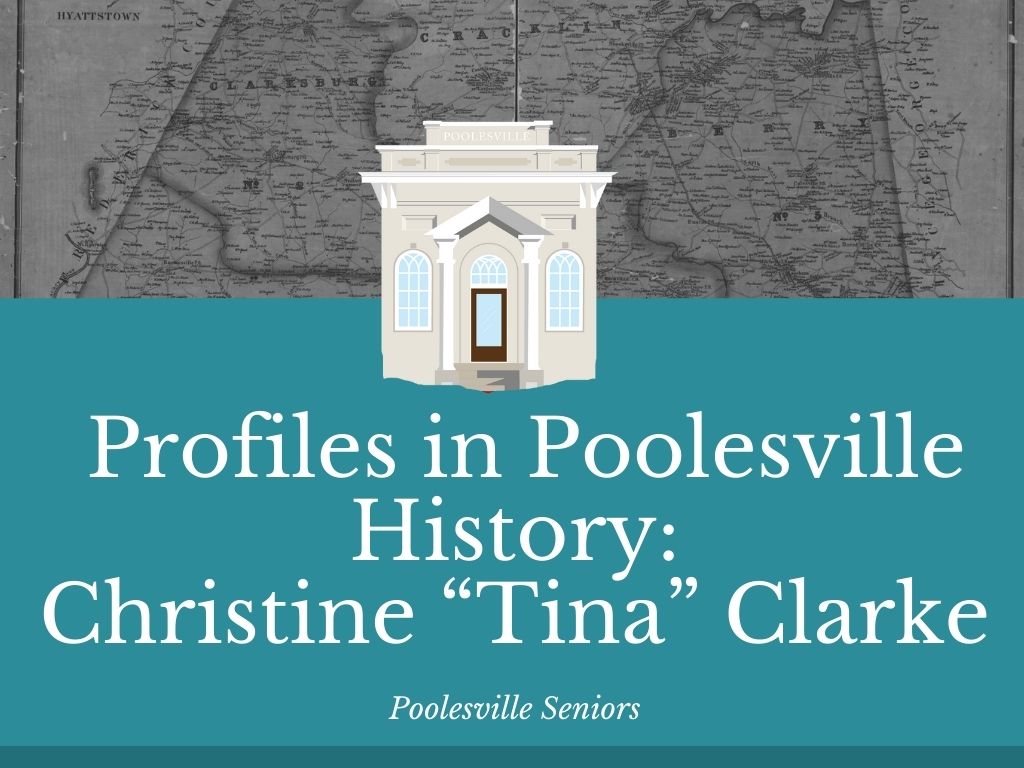Imagine for a minute that you’re living in Montgomery County in the 1950’s. You’re denied entrance to a restaurant, you’re denied access to the public library, and a library card to borrow books, you’re even denied access to a dance hall, all because of the color of your skin.
As part of our Profiles in Poolesville history series, we are highlighting someone who suffered all those indignities and perhaps more. Christine Clarke is one of Montgomery County’s most recognizable champions for social justice. She has strong Poolesville ties to a family legendary for their own educational firsts.
This local luminary, born in 1938, was raised in the freedman’s enclave of Jerusalem. The four-acre tract of land she grew up on was a section of a broader Clarke family-owned parcel of 20 acres. Her childhood home was built by her great grandfather James Clarke, formerly enslaved, and is noted on Montgomery County’s African American Historical Map.
Early on, Christine learned the significance of her family and their legacy. Both her grandfather Noah Clarke and aunt, Nina Honemond Clarke achieved historic firsts for Jerusalem and the County. (Check out the links above to learn about their contributions.)
During her early years in Jerusalem, Christine became aware of other family members’ barrier-breaking achievements. She credits both her minister and her aunt Beulah Mae Clarke Harper (born 1911) for their efforts to meet the great need she also observed in the community. Aunt Beulah, who would go on to be a co-founder of our present day WUMCO, made sure folks never wanted for anything –not coats, canned goods or doctor visit carpool.
As Christine grew, so did her social conscience. The fighting spirit of her father, Raymond Joy Clarke (born 1913), inspired her membership in the NAACP (National Association for the Advancement of Colored People) at the age of 13.
In the 1940’s, Christine and her family moved from the warmth and safety of her cloistered Jerusalem community in Poolesville. For the first time Christine witnessed racism firsthand in its various forms. She was refused a library card. Her family was refused seating at a restaurant. Recreational sites were segregated or had strict no admittance policies for Black people. During these times, our country was grappling with rapidly changing social and political landscapes and so was Maryland and Montgomery County. Christine and other family members actively engaged in protests to effect social change.
Before Montgomery County schools were integrated, Christine graduated from Lincoln Junior High School, and Washington Carver Senior High School in 1956. Both Rockville schools for Black students were made possible through the efforts of her grandfather Noah.
Following a family tradition that highly prized education, Christine graduated from the University of D.C. and was awarded a scholarship to American University where she earned both a Bachelor’s and Master of Education.
In her professional life, Christine worked fervently to rally against the social, educational, and economic injustices she witnessed. She served as a public health advisor for the County Department of Health, specializing in minority outreach. In 1996, Christine was appointed as the African American liaison to former Montgomery County Executive Douglas Duncan. She worked for the County for 28 years.
For her work confronting racial injustice, Christine was a 2006 inductee into the Montgomery County Human Rights Hall of Fame. Her name appears on a sculpture at the Executive Office Building in Rockville. In 2017, she received the County’s African American Living Legend Award for her humanitarian efforts.
Post retirement, Christine showed no signs of slowing down. She taught special needs children at South Lake Elementary School in Gaithersburg. Her legacy is long and strong, and from an early age she was taught to always do her best. We salute local luminary Christine Clarke for giving decades of her best to helping others in Montgomery County.

